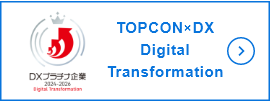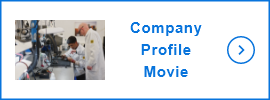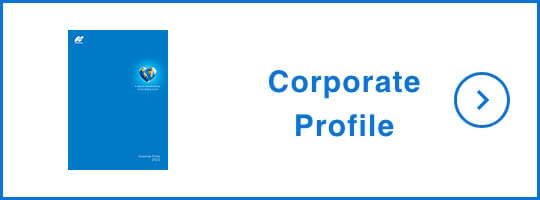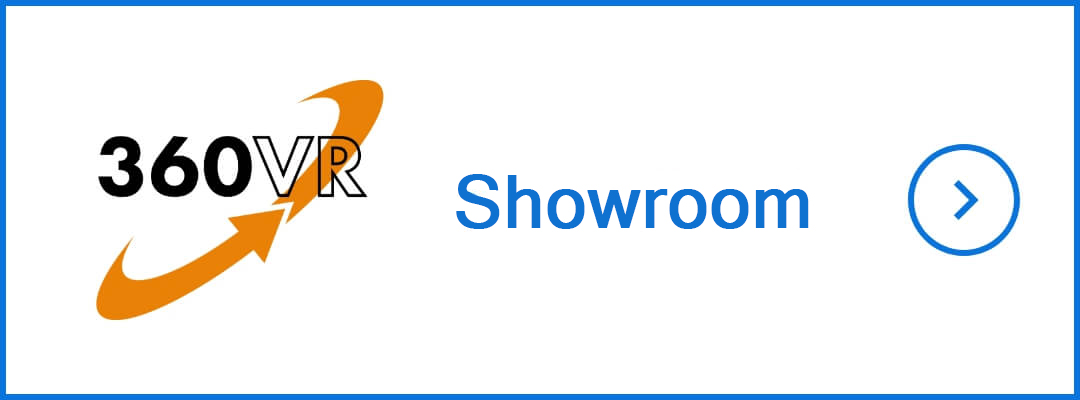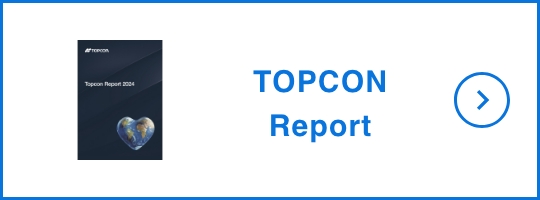1. Basic Approach to Corporate Governance
Topcon has established the TOPCON Corporate Governance Guidelines in pursuit of the sustainable growth and medium- to long-term enhancement of corporate value of the Topcon Group (hereinafter referred to as the “Group”), comprising the Company and its affiliated companies, based on TOPCON WAY, a set of the fundamental values, evaluation standards, and basic principles of conduct to be shared by directors, corporate auditors, officers and employees of the Group in its aim to achieve effective corporate governance.
* Read more about the TOPCON WAY here.
2. Corporate Governance Structure
1. Corporate organization
Topcon has adopted the “company with a Board of Corporate Auditors” as its corporate structure under the Companies Act.
The Board of Directors shall nominate multiple independent outside directors to enhance supervisory functions by incorporating outside opinions into management.
The Board of Corporate Auditors and Corporate Audit Division (internal audit department) discuss each of their audit plans and policies, etc., in advance. They work in mutual cooperation by regularly sharing information throughout the fiscal year to increase the efficiency and effectiveness of the operations of the Corporate Auditors.
As an advisory body to the Board of Directors, the Company shall establish a Nomination and Compensation Advisory Committee, which shall appoint an independent outside director as chairperson and shall be comprised of a majority of independent outside directors.
2. Board of Directors
ⅰ)Roles and responsibilities of the Board of Directors
The Board of Directors recognizes its fiduciary responsibility to shareholders towards the sustainable growth and medium- to long-term enhancement of corporate value of the Group. Based on such recognition, the Board of Directors works to achieve “improved management efficiency” in addition to “maintaining management soundness” and “ensuring transparency in management”, as well as to fulfill its responsibilities towards all stakeholders in the management of the Group.
To fulfill the responsibilities as stated above, the Board of Directors conducts, from an independent and objective standpoint, the assessment of the performance, appropriate development and implementation of internal control systems and risk management system, as well as the supervision of the overall business management of the Company.
The Board of Directors makes decisions on matters provided for in laws and regulations and the Articles of Incorporation as well as on important matters relating to business management. The Board of Directors has adopted the “Executive Officer System” as a business execution system based on its decision making, and delegates day-to-day business execution to Executive Officers. Executive Officers are appointed by a resolution of the Board of Directors, taking into account their level of knowledge and experience as required in the relevant business field of the Company.
The Board of Directors establishes a system to respond to cases where a Corporate Auditor or the Accounting Auditor discovers misconduct and requests appropriate measures, or identifies any inadequacies or problems.
The Board of Directors analyzes and evaluates the effectiveness of the Board of Directors and discloses a summary of the results.
ⅱ) Composition of the Board of Directors
The Board of Directors of the Company consists of ten directors (including five outside directors).
The Company ensures the system to supervise the operation of the Company by appointing more than one Independent Outside Director, who express their opinions from an independent and objective standpoint at the meetings of the Board of Directors.
The Board of Directors is composed of Directors who have different backgrounds in terms of expertise and experience, and maintains the proper number of Directors so that the Board of Directors can effectively exercise its decision-making and supervisory functions.
ⅲ) Internal control systems
In order to ensure smooth business operations under appropriate control, the Board of Directors sets forth basic policies regarding the development of internal control systems, and supervises the establishment of the Group’s structure and the status of implementation thereof to ensure compliance, appropriate financial reporting, and risk management.
The Company has established the Corporate Audit Division as an internal audit department to validate the appropriateness and effectiveness of internal management systems, and maintains a system that facilitates the timely reporting of any significant matters to the Board of Directors, etc.
The Company has established the Basic Rules for Risk and Compliance for the development of a risk management system capable of responding to any risk that arises within the Group in a timely and appropriate manner depending on the nature of the risk.
The competing transactions of Directors, transactions between Directors and the Company, and transactions that involve conflicts of interest of both parties shall be matters to be approved by the Board of Directors.
3. Board of Corporate Auditors
ⅰ)Roles and responsibilities of the Board of Corporate Auditors
The Board of Corporate Auditors recognizes responsibility to shareholders as the trustees of shareholder assets. The Board acts to ensure corporate stability towards achieving sustainable Group growth and medium- to long-term improvements towards our corporate value in order to generate profit that is shared with our shareholders.
The Board of Corporate Auditors works with Outside Directors and the internal audit department
ⅱ)Structure of the Board of Corporate Auditors
To ensure transparency and fairness, Independent Outside Auditors comprise the majority of the Topcon Board of Corporate Auditors.
The Board of Corporate Auditors of the Company consists of four Corporate Auditors (including two outside Corporate Auditors).
Persons with appropriate experience and competency are nominated to serve as Corporate Auditors.
The Board of Corporate Auditors nominates one or more members with knowledge of finance, accounting, and legal affairs, particularly persons with expertise in finance and accounting, necessary to ensure the functions of the Board of Corporate Auditors.
ⅲ)Relationships with the Accounting Auditor and internal audit department
The Board of Corporate Auditors has established a system to conduct sufficient and appropriate audits in collaboration with the Accounting Auditor and the internal audit department.
The Board of Corporate Auditors evaluates the independence and expertise of the Accounting Auditor by formulating assessment and appointment standards of the Accounting Auditor for the purpose of appropriate selection and assessment.
The Board of Corporate Auditors establishes a system to respond to cases where the Accounting Auditor or internal audit department discovers misconduct and requests appropriate measures, or identifies any inadequacies or problems.
4. Accounting Auditor
The Accounting Auditor assumes an important role to secure the reliability of the financial information of the Group and bears responsibility to shareholders and investors.
The Accounting Auditor ensures a system under which it can conduct appropriate audits in collaboration with the Board of Corporate Auditors.
The Accounting Auditor ensures independence and expertise.
The Accounting Auditor complies with standards on quality control for audits necessary to appropriately conduct accounting audits.
5. Nomination and Compensation Advisory Committee
The Company has established the Nomination and Compensation Advisory Committee, which is independent of the Board of Directors, for the purpose of ensuring objectivity and transparency in the selection of candidates for President and Director and in the handling of compensation for Directors.
The Nomination and Compensation Advisory Committee is chaired by an independent outside director and the majority of its members are independent outside directors.
The Nomination and Compensation Advisory Committee makes recommendations to the Board of Directors in response to the Board of Directors’ inquiries.
6. Internal audit department, etc.
The Company has established the Corporate Audit Division as an internal audit department to validate the appropriateness and effectiveness of internal management systems, as follows:
The Corporate Audit Division aims to contribute to enhancing the corporate governance and risk management of the Group. The Corporate Audit Division is responsible for the internal audit process, and develops a system under which the Corporate Audit Division validates the appropriateness and effectiveness of internal management systems such as compliance, and reports to the Board of Directors, the Board of Corporate Auditors, and Representative Director President in a timely manner if any significant issue is discovered.
The Corporate Audit Division conducts group company audits in collaboration with Corporate Auditors and the Accounting Auditor to ensure the appropriate business conduct of the entire Group.
With respect to whistleblowing matters, the Corporate Audit Division shall contribute to the early discovery of risk information and conduct measures regarding the nature of the whistleblowing matter in a swift and appropriate manner.
7. Directors and Corporate Auditors
ⅰ)Directors
Directors recognize their fiduciary responsibility to shareholders and execute their duties as Directors towards the sustainable growth and medium- to long-term enhancement of corporate value.
Directors, as members of the Board of Directors, supervise the execution of business operations by Executive Directors and Executive Officers.
Directors collect sufficient information to execute their duties, while requesting explanations on various matters and proactively expressing opinions and holding open and constructive discussions at meetings of the Board of Directors.
Directors proactively collect information for appropriately fulfilling their roles and responsibilities, and if necessary, seek the advice of external experts at the expense of the Company.
As an executive incentive for Directors (excluding Outside Directors), the Company adopts medium- to long-term performance-linked compensation and restricted stock compensation with the aim of achieving the Group’s sustainable growth and enhancing corporate value over the medium to long term (excluding outside directors).
ⅱ)Corporate Auditors
Corporate Auditors recognize their fiduciary responsibility to shareholders and execute their duties as Corporate Auditors, ensuring corporate soundness towards the sustainable growth and medium- to long-term enhancement of corporate value.
In accordance with policies and assigned duties set forth by the Board of Corporate Auditors, Corporate Auditors conduct audits on the status of the execution of duties by the Directors and Executive Officers, etc., of the Company, through the following activities: attending important meetings of the Company, including the meetings of the Board of Directors; receiving reports from Directors, etc. on the status of their execution of duties; receiving materials and information on related matters; and collaborating with the internal audit department and the Accounting Auditor.
Corporate Auditors audit the decision making by the Board of Directors and the status of the development and implementation of internal control systems.
Corporate Auditors proactively collect information for appropriately fulfilling their roles and responsibilities, and if necessary, seek the advice of external experts at the expense of the Company.
ⅲ)Independent Outside Directors and Independent Outside Corporate Auditors
Independent Outside Directors and Independent Outside Corporate Auditors supervise the execution of business operations, provide advice for the sustainable growth and medium- to long-term enhancement of corporate value, and manage conflicts of interest, while conveying the opinions of stakeholders including minority shareholders to the Board of Directors.
There are five independent outside directors and two independent outside corporate auditors.
Independent Outside Directors share information regarding matters related to the business and corporate governance of the Group and exchange opinions with each Director, Executive Officer, and Corporate Auditor.
The Company appoints the Outside Directors and Outside Corporate Auditors who meet the criteria for independence specified by financial instruments exchanges.
Independent Outside Directors and Independent Outside Corporate Auditors work to exchange information and share perspectives based on an independent and objective standpoint by holding of regular meetings.
iv) Support System
The Company has established an effective and sufficient support system for directors and corporate auditors to fulfill their roles and responsibilities as follows
The Company operates its Board of Directors meetings as follows to enable sufficient discussion at Board of Directors meetings.
(1) The Company prepares an annual schedule of Board of Directors meetings and makes an annual plan of items to be discussed.
(2) Appropriate deliberation time is set aside for sufficient discussion at Board of Directors meetings.
(3) Materials related to matters to be discussed at Board of Directors meetings are distributed well in advance.
(4) In addition to the above, information necessary for directors to make decisions and for corporate auditors to perform their duties is provided as needed.
- In addition to the above, the Company provides information necessary for directors to make decisions and corporate auditors to perform their duties as needed.
- The Company appoints assistants as necessary to assist the statutory auditors in their duties and to support other activities of the statutory auditors, and provides corporate information requested by the statutory auditors and coordinates internal collaboration.
- The Company proactively provides outside directors and outside corporate auditors with information necessary for the execution of their duties when requested to do so.
- The Company secures budgets deemed necessary for the execution of duties by Directors and Corporate Auditors.
v)Training policies
The Company provides information and knowledge on business activities necessary for Directors and Corporate Auditors to fulfill their roles and responsibilities appropriately in accordance with the following provisions.
When Directors or Corporate Auditors are newly appointed, the Company provides training regarding laws and regulations related to the business of the Group and the Group’s corporate governance, and provides, on an ongoing basis, such training even after assuming office as Directors and Corporate Auditors.
In addition to the aforementioned, when Outside Directors and Outside Corporate Auditors are newly appointed, the Company provides the information regarding the Group’s business and overall organization, etc., and also provides, on an ongoing basis, the necessary information regarding the Group’s business strategies and issues to be addressed, etc., even after assuming office.
Topcon’s Corporate Governance Structure As of June 26 2025
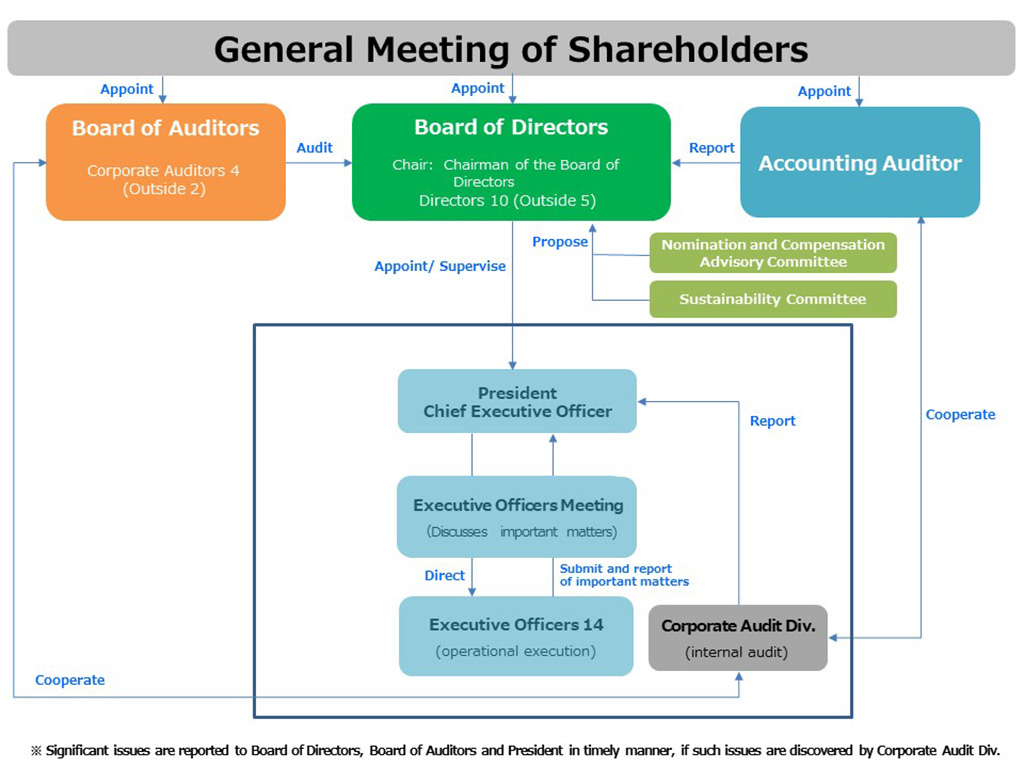
Pertinent material
Adobe Acrobat Reader is needed to view PDF formatted files.
Adobe Reader is distributed freely by Adobe Systems.

